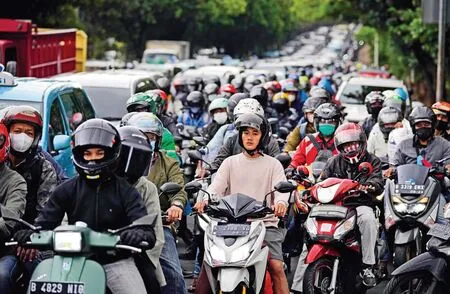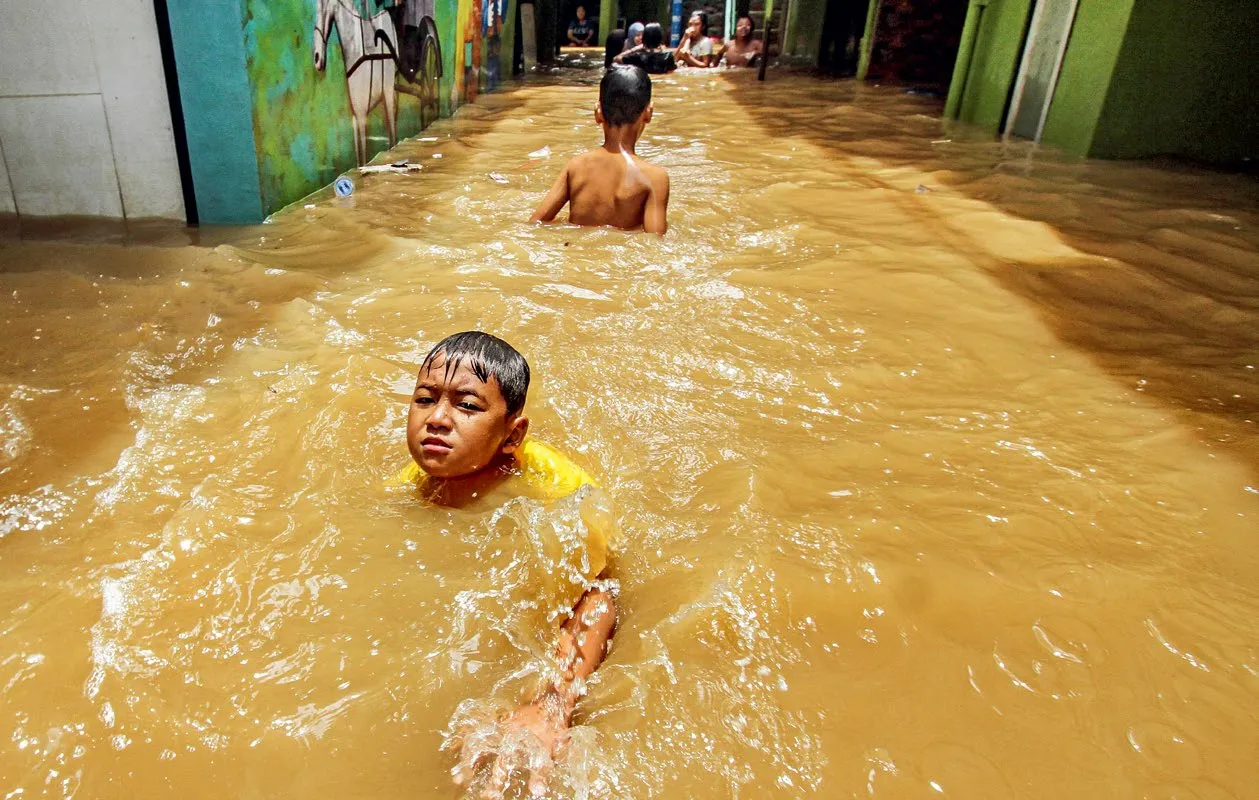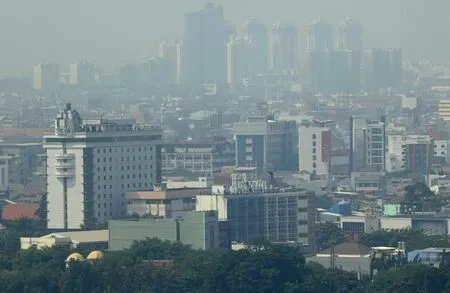Relocating the Capital:Pressure Valve or Pump?
By Hu Yukun
Skeptics are concerned about the economic cost and possible environmental impact
“this capital will not only have government offices,” declared Indonesian President Joko Widodo in a January 17 speech at a university. “We want to build a new smart metropolis that can be a magnet for global talent and a center of innovation.”
With a vision of a new capital “where the people are close from any destination, where they can bike and walk everywhere because there are zero emissions,” Indonesian government now has the legal mandate to launch one of its biggest infrastructure projects ever, estimated to cost 466 trillion rupiah (US$32.4 billion).
Undoubtedly the challenges facing Jakarta and the whole country have given urgency to the issue of capital relocation, yet the question remains whether a new capital will bring relief or create new problems.
Planners hope the project will be key to solving various problems that have been haunting the archipelago for years.
The Real “Archipelago”?
On January 18, the day after President Joko Widodo’s speech, the People’s Representative Council, Indonesia’s house of representatives, passed the new state capital law, providing a legal framework for relocating the country’s capital from Jakarta to a coastal jungle area on Borneo island. The relocation idea was first proposed more than two years ago.
The name of the new capital was also announced. “Nusantara,” meaning “archipelago” in Javanese, was chosen from a list of 80 names because it is widely recognizable to Indonesians and easy to memorize, according to Suharso Monoarfa, Minister of National Development Planning.
About 1,300 kilometers (800 miles) from Jakarta and closer to the geographic center of Indonesia, a vast archipelago of 17,000 islands, Nusantara now carries the expectations of the government and the whole nation. The project is more than just a future administrative center. Planners hope the project will be key to solving various problems that have been haunting the archipelago for years.
For many reasons, the government has accepted that maintaining the status quo is no longer feasible. If not for the COVID-19 pandemic, construction of the new capital would have started in 2020 because the government could not wait.

Java is the world’s most populous island but only the fifth largest in Indonesia. It is home to around 55 percent of the country’s 270 million people. Situated on swampy land on the northwestern coast of the island, Jakarta has been grappling with problems stemming from a relentlessly growing population that already surpasses 10 million.
Of course overpopulation is the primary and most urgent burden to be relieved. Back in 2015, Jakarta was already ranked by Time as the worst city for traffic jams in the world, with approximately 33,240 stop-starts per car per year, according to satellite navigation data. While around 3.5 million people choose to commute into the hot and humid city by car from elsewhere in the metropolitan area of Greater Jakarta, they have to stay motionless in the gridlock during most of the rush hour from 5 a.m. to 8 a.m. and from 5 p.m. to 8 p.m.
This routine would not be necessary without such high population density (9,756/km2) and certainly results in an even more severe problem:pollution.

Motorists stuck in the morning rush hour traffic in Jakarta, Indonesia, January 26, 2022. (DITA ALANGKARA)
Before the COVID-19 pandemic, the Jakarta Health Agency’s data was terrifying:In 2019, the city had only two days with air quality meeting the standard of “healthy.” Local manager Andy Rahman complained to a CNA reporter that his eyes were burning, his throat hurt, and he began to cough after 30 minutes of cycling. The New York Times wrote that even walking the streets could be a “hazardous exercise.”
On city construction, time cannot heal all wounds, but Jakarta may be different. Described as the world’s most rapidly sinking city, the current capital could not resist the need for overextraction of groundwater nor stop the rising Java Sea due to climate change. At the current rate (about 25cm a year), around one third of the city could be submerged by 2050, experts predict.
“There were many times I could not go out because the roads were flooded,” recalled Stella Kusumawardhani, an economic researcher at Tenggara Strategics, a business and investment research institution based in Jakarta. “My friends suffered huge material losses because of the floods, and some people lost family members. People generally recognize that moving the capital is necessary.”
It is not just another capital relocation project in the ASEAN region. It is a race against time.
Environmental Concerns
Despite all the urgency and the precedents of constructing dedicated capitals around the world, the government’s plan is not without controversy. No one knows how long it will take for Nusantara to effectively function to relieve pressure off Jakarta as planned, but skeptics seem quite sure that new pressure created by the project is imminent.
“The only problem is our country does not have the money to build a new city while dealing with the COVID-19 pandemic,” added Stella. On March 9, one of the most prominent investors in the project, Masayoshi Son, founder of SoftBank Group, pulled out, leaving even more uncertainty surrounding the funding of the capital relocation project. The only certainty was that the Indonesian government could not cover all the costs alone.
Even previously, JATAM (a local network of non-government organizations and community groups) and other critics accused President Widodo and the parliament of failing to address Indonesia’s economic difficulties in the midst of the pandemic, calling the project a “waste of money that will add new debt to the state.”
According to Statista, a German company specializing in statistics and surveys, last year Indonesia’s national debt to GDP ratio exceeded 40 percent for the first time in the 21st Century, nearly 11 percent higher than in the year 2019 when the government had just proposed the relocation plan and the economy had not yet been hit by COVID-19.

Children play in the water after a flood in Kebon Pala area, Jakarta, Indonesia, on November 8, 2021. (EKO SISWONO TOYUDHO)

A smoggy haze obscures downtown Jakarta on July 24, 2019. (BAY ISMOYO)
Alongside financial and macroeconomic uncertainties, dissenting voices have emerged among residents of East Kalimantan, the province that will host the new capital. Difficulties in land concession and acquisition all add to the likelihood that Nusantara will not be built anytime soon.
And to be clear:No one in Indonesia expects Nusantara to immediately replace Jakarta in all aspects, because it certainly never will.
Just after the new legislation started paving the way for the relocation, Jakarta governor Anies Baswedan insisted that the current capital would “continue to be the center of the economy, the center of other sectors like culture, and the hub of the nation” in a press conference.
This sentiment was echoed by Muhamad Eka Yudhistira, a Jakartan who works in hospitality. Having suffered from traffic jams and pollution for years, he expects the city to remain the nation’s economic hub with old burdens eased a bit.
More importantly, no matter when the relocation project is completed, Jakarta will remain central for ASEAN. As early as October 2019, shortly after the capital relocation plan was proposed, ASEAN Secretary-General Lim Jock Hoi made it clear that the ASEAN headquarters would remain in Jakarta, considering a new building for them just went up there.
Likening the city to New York where the headquarters of the United Nations is seated, he predicted that “Jakarta would remain the capital of ASEAN,” even if it is not Indonesia’s capital.
Another lingering question really matters:Is the move creating new environmental burdens on more land rather than substantially reducing the current burden on Jakarta?
Almost all the local environmentalist groups and figures in the country share this concern. Even under normal circumstances, lack of access to clean water is deemed a “crisis” in Borneo. If, as Indonesia’s Ministry of National Development Planning has projected, the population of the region grows from 100,000 to 700,000 by 2025, and to 1.5 million by 2035, the government and people will have an exponentially worse water scarcity problem on their hands.
For the island comprising 15,000 plant species and over 1,400 amphibians, birds, fishes, mammals, reptiles, and insects, building a new modern city with an influx of more than a million people would certainly be a huge burden on its biodiversity, especially the 140-million-year-old rainforest.
Dwi Sawung from the Indonesian Forum for Living Environment (WALHI) believes that at least three basic problems have been ignored by the Indonesian government:threats to water systems and climate change, threats to flora and fauna, and threats of pollution and environmental damage.
What’s worse, local residents might witness their economic roots removed as cultivators, hunters, farmers, and fishermen are evicted from their way of life because of development of a new capital.
Stella also fears that the heat will make Nusantara an uncomfortable place to reside. Closer to the equator, its temperature can sometimes reach 40 degrees Celsius, and cars have to be parked underground or in shade to prevent them from getting burnt up. To absorb such heat, many trees need to be planted in the new capital, like Singapore has done.
But still, she does not reject the possibility of moving to the new capital, as long as it is built as advertised, not only because her work deals with the government and private sector.
“I have been dying to save myself from the poor air quality in Greater Jakarta which has caused me material and immaterial losses.”
But Stella will still have to wait because the first wave of moving will not start until at least 2024, and the final mission will not be complete until at least 2045.

